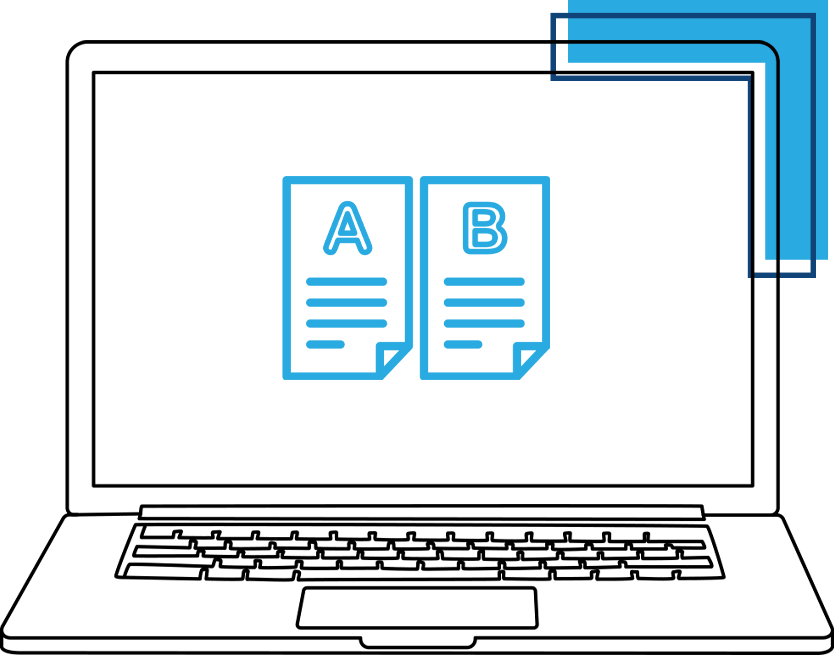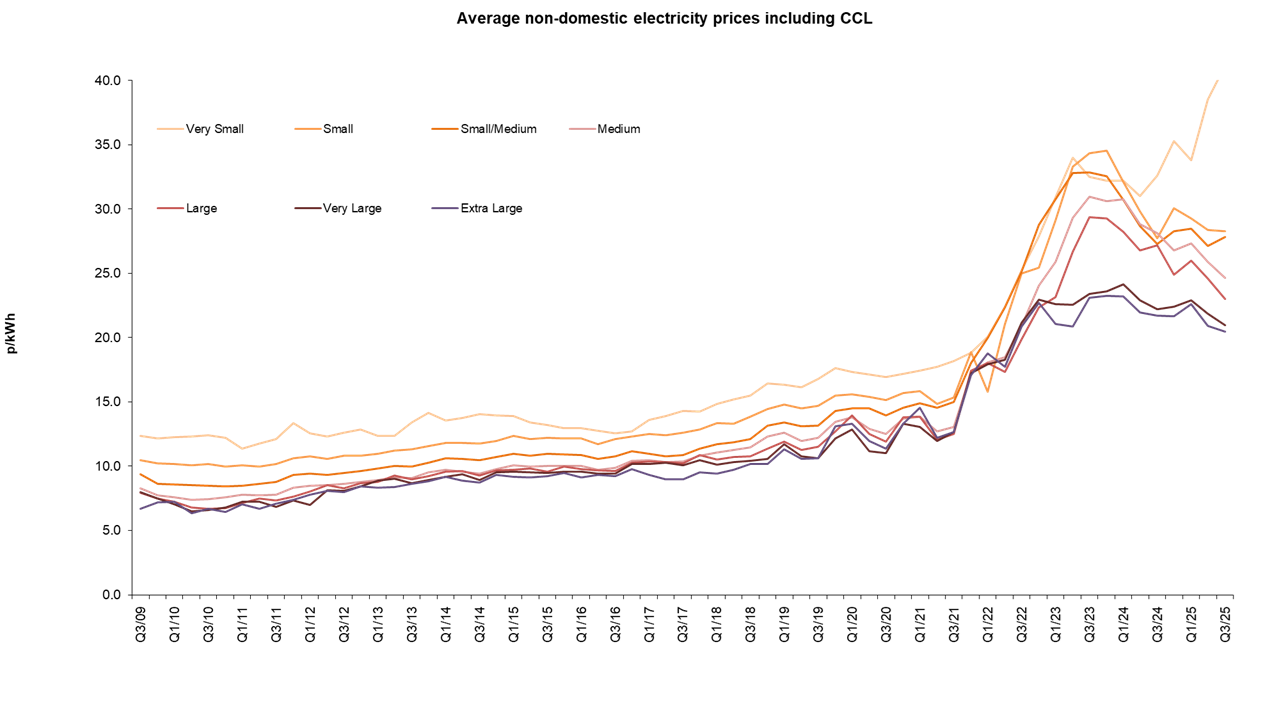2026 Business Electricity Rates Per kWh
Looking for the latest business electricity prices per kWH in 2026? Below you can see both average rates for all different business sizes as well the best deals available on the market.

Average Business Electricity Rates In 2026
The table below shows what the average business in the UK paid for their electricity in Q3 2025, based their annual electricity consumption.
| Business Size | Annual Electricity Usage (MWh) | Average Electricity Rates in Pence per kWh* (excluding CCL) | Average Electricity Rates in Pence per kWh* (including CCL) | Best Rates Price Per kWh |
|---|---|---|---|---|
| Very Small | 0 – 20 | 40.64 p/kWh | 41.15 p/kWh | Click Here For Live Prices |
| Small | 20 – 499 | 27.57 p/kWh | 28.27 p/kWh | Click Here For Live Prices |
| Small/Medium | 500 – 1,999 | 27.23 p/kWh | 27.81 p/kWh | Click Here For Live Prices |
| Medium | 2,000 – 19,999 | 24.11 p/kWh | 24.65 p/kWh | Click Here For Live Prices |
| Large | 20,000 – 69,999 | 22.46 p/kWh | 23.01 p/kWh | Click Here For Live Prices |
| Very Large | 70,000 – 150,000 | 20.50 p/kWh | 20.98 p/kWh | Click Here For Live Prices |
| Extra Large | >150,000 | 20.05 p/kWh | 20.49 p/kWh | Click Here For Live Prices |
| Average For All UK Businesses | NA | 22.96 p/kWh | 23.47 p/kWh | Click Here For Live Prices |
* Note data comes from gov.uk, and goes up to Q3 2025 which is the latest data available.
However, the rates listed above are an average only, which means half of businesses are likely paying less.
Moreover, business energy prices have been extremely volatile the last few years so it is worth getting a quote even if you are paying less than the rates listed above.
Business Electricity Price Trends
The two charts and one table below show how much electricity tariffs in the UK have increased over the past 5 years.
| Business Size | Average Electricity Rates in Pence per kWh* (including CCL) | YoY Price Increase P/kWh Including CCL | 5 Year Price Increase P/kWh Including CCL |
|---|---|---|---|
| Very Small | 41.15 p/kWh | 26.17% | 142.98% |
| Small | 28.27 p/kWh | 2.00% | 86.65% |
| Small/Medium | 27.81 p/kWh | 1.83% | 99.33% |
| Medium | 24.65 p/kWh | -12.36% | 96.76% |
| Large | 23.01 p/kWh | -15.41% | 92.87% |
| Very Large | 20.98 p/kWh | -5.64% | 89.97% |
| Extra Large | 20.49 p/kWh | -5.68% | 80.01% |
| UK Average | 23.47 p/kWh | -8.57% | 82.19% |
Best Business Electricity Deals In 2026?
Given the volatile nature of the energy market right now, it’s difficult to know who has the best deal at any given moment.
Our partners at Love Energy currently have suppliers offering rates as low as 29.6p p/kWh with daily standing charge of 39.1p per day for micro businesses (up to 5,000kWh per year) based on a 2-year fixed rate deal.
Medium sized customers (15,000-25,000kWh per year) can find rates as low as 26.9p p/kWh with daily standing charge 43.6p per day based on a 2-year fixed rate deal.
But one supplier is offering rates as low as 24.8p p/kWh but it comes with a daily standing charge of 90.2p day.
To get the latest tariff deals for your business your best bet is to check live prices for your business size and location by clicking the button below.
Which Energy Company Has The Highest Electricity Prices?
Want to avoid companies with the highest prices? Then have a look at deemed and out-of-contract rates.

Unlike in the past, there is less of difference in rates between suppliers when in contract.
However, out of contract and deemed rates are a different matter as the table below shows:
Note these were believed to be the most up-to-date rates at the time of publication, but may have since changed. They are to used for refence purposes only. Please double check before buying:
| Company Name | Electricity Deemed Rates (01 – 04 Profiles) Unit Rate | Electricity Deemed Rates (01 – 04 Profiles) Standing Charge | Electricity Deemed Rates (Half Hourly 05 – 08 Profiles) Unit Rate | Electricity Deemed Rates (Half Hourly 05 – 08 Profiles) Standing Charge |
|---|---|---|---|---|
| British Gas Deemed Rates | 38.04 p/kWh | 244.02 p/day | 37.72 p/kWh | 576.89 p/day |
| British Gas Lite Deemed Rates | 38.04 p/kWh | 233.04 p/day | 37.70 p/kWh | 576.65 p/day |
| Octopus Energy Deemed Rates | 24.499 p/kWh | 58.03 p/day | Not Listed | Not Listed |
| Utilita Deemed Rates | 29.75 p/kWh | 80 p/day | 27.422 p/kWh | 1440 p/day |
| EDF Deemed Rates | 37.72 p/kWh | 200 p/day | 38.54 p/kWh | 200 p/day |
| E.ON Next Deemed Rates | 46.88 p/kWh | 200 p/day | 44.47 p/kWh | 686.29 p/day |
| Good Energy Deemed Rates | 30.05 p/kWh | 211.95 p/day | 31.22 p/kWh | 211.95 p/day |
| Opus Energy Deemed Rates | 35 p/kWh | 200 p/day | 32 p/kWh | 700 p/day |
| Clear Business Deemed Rates | 54 p/kWh | 250 p/day | 54 p/kWh | 500 p/day |
| TotalEnergies Gas & Power Deemed Rates | 38.06 p/kWh | Unknown | 31.33 p/kWh | Not Listed |
| Pozitive Energy Deemed Rates | 35 p/kWh | 150 p/day | Not Listed | Not Listed |
| Ecotricity Deemed Rates | 31.3 p/kWh | 60.09 p/day | 31.68 p/kWh | 60.33 p/day |
| kinex Deemed Rates | 60 p/kWh | 250 p/day | 60 p/kWh | 500 p/day |
| Yü Energy Deemed Rates | 39.6 p/kWh | 300 p/day | 43.33 p/kWh | 2950 p/day |
| Robin Hood Energy Deemed Rates | 22.03 p/kWh | 58 p/day | 23.53 p/kWh | 323.54 p/day |
| SmartestEnergy Deemed Rates | 27.72 p/kWh | 234 p/day | 27.68 p/kWh | 234 p/day |
| Valda Energy Deemed Rates | 41 p/kWh | 100 p/day | 41 p/kWh | 350 p/day |
| Yorkshire Gas and Power Deemed Rates | 40 p/kWh | 196 p/day | 40 p/kWh | 1300 p/day |
| Corona Energy Deemed Rates | 29.90 p/kWh | 532 p/day | 29.17 p/kWh | 1367 p/day |
| Maxen Power Deemed Rates | 32.99 p/kWh | 200 p/day | 32.99 p/kWh | 200 p/day |
| Power NI Deemed Rates | 28.31 p/kWh | Unknown | Not Listed | Not Listed |
| United Gas & Power Deemed Rates | 36 p/kWh | 400 p/day | 36 p/kWh | 2500 p/day |
| npower Business Solutions Deemed Rates | 34.70 p/kWh | 141.20 p/day | 38.97 p/kWh | 1052.49 p/day |
| Shell Energy Deemed Rates | 36.870 p/kWh | 334 p/day | 37.093 p/kWh | 2881 p/day |
| SEFE Energy Deemed Rates | 26.36 p/kWh | 232 p/day | 26.36 p/kWh | 748 p/day |
| ScottishPower Deemed Rates | 34.89 p/kWh | 144.70 p/day | Not Listed | Not Listed |
| BES Utilities Deemed Rates | 43.9 p/kWh | 300 p/day | 40.7 p/kWh | 500 p/day |
| D-ENERGi Deemed Rates | 49.14 p/kWh | Unknown | 49.14 p/kWh | Not Listed |
| SSE Deemed Rates | 46.06 p/kWh | 162.29 p/day | 43.89 p/kWh | 399.39 p/day |
| Drax Deemed Rates | 36.63 p/kWh | 300 p/day | 36.63 p/kWh | 300 p/day |
What are Out-of-Contract and Deemed Rates?
Both refer to situations where your business energy is being supplied without an active, agreed contract in place, but there is a difference:
Deemed Rates
- These apply when you start using energy at a premises without arranging a contract, like when you move into a new building.
- The supplier has a legal obligation to supply you, but since no contract is in place, they charge a higher “deemed” rate.
- It’s a default rate, not negotiated, so it’s typically expensive (just look at the table above).
Out-of-Contract Rates
- These kick in if your fixed-term contract ends and:
- You haven’t agreed a new deal, and
- You haven’t switched suppliers.
- Your supplier continues providing energy, but again at much higher rates, sometimes even worse than deemed rates.
Why Are These Rates Higher?
Because they’re meant to discourage inactivity.
Suppliers take on more risk with uncertain supply durations and no guarantee of future payments, so they charge a premium.
Typical out-of-contract or deemed rates can be 2–3x more expensive than negotiated contract rates.
When Do These Situations Happen?
Deemed Rates:
- You move into a new premises and start using energy without contacting the supplier.
- You inherit a property with no energy contract in place.
- A previous tenant or business vacated, and no new agreement was made.
Out-of-Contract Rates:
Your fixed-term deal ends and you:
- Don’t renew
- Don’t switch suppliers
Sometimes happens if your auto-renewal option is removed or if your supplier changes terms without your knowledge.
How to Avoid Them
Here’s how to steer clear:
- Monitor Your Contract End Date
- Set reminders 3–6 months before the end date.
- Contact your supplier or broker to renegotiate or compare deals early.
- Don’t Delay When Moving Premises
- Contact the current supplier as soon as possible.
- Set up a new contract or transfer your existing one if possible.
- Switch or Renew Promptly
- Compare tariffs before your contract ends.
- If switching, confirm the switch-over date so you don’t fall into an out-of-contract period.
- Use a Broker or Comparison Service
- They can help ensure continuity of supply and find the best rates.
- Also useful for managing multiple sites or meters.
Pro Tip:
Even if you’re currently on deemed or out-of-contract rates, you can switch or negotiate a new deal at any time. You’re not locked in!
Do it ASAP to save money.

UK Business Electricity Comparison
Whether you’re trying to reduce your business expenses, or simply want to make sure that you’re getting the best electricity rates possible – it’s always important to compare business electricity prices.

With so many business electricity suppliers out there, you may be finding it hard to narrow down your options. If you’re feeling unsure, this handy guide has everything you need to know about business electricity – so that cutting your bills will be effortless.
It may seem simple, but taking the time to do some research is the best way to get to know the market, check what’s available, and secure the best business tariffs for your needs.
If you’d like any further information, scroll to the bottom for the answers to some key FAQs!
How to Compare Business Electricity Prices
In order to help you find the best electricity rates around – here’s some vital information on all aspects of business electricity. From useful tips to selecting a reputable supplier – this guide has everything covered.

Types of Business Electricity Tariffs
Firstly, it’s important to understand the different kinds of energy tariffs available, as this will allow you to make the right choice for your business’ energy needs.
Some of the most common options for businesses include:


Fixed-rate tariffs
With fixed-rate electricity rates, you’ll pay your supplier a pre-agreed rate per kWh. These kinds of tariffs usually come with a fixed term, which can be anything from 1 year to 5 years, depending on your contract.
Having fixed electricity rates can be a great way to protect yourself against rising energy costs – as the price you pay per kWh won’t change at all during your contract.
Deemed Rates
The majority of businesses who find themselves being charged deemed rates probably haven’t reached an agreement with their energy supplier at all.
You’ll usually incur deemed rates if you’ve been using electricity and gas without signing a contract with your supplier. This might be if your business has recently moved into a new building, or if you forgot to renew your old contract before the deadline.
Remember, most of the time a deemed rate contract will not be the best deal your supplier has to offer. In order to make savings on your energy consumption, it’s important to switch to a new tariff or supplier as soon as you realise you’re being charged deemed rates.
Variable-rate tariffs
Unlike with fixed-rate tariffs, where your costs per kWh stay the same – with a variable contract, your electricity rates will fluctuate alongside the market.
This is a great option if you’re unhappy with the standard rate your supplier offers for a fixed tariff.
As your electricity rates will follow current market guidelines, you might actually be able to make huge savings in the event that energy prices fall. However, if market prices rocket sky-high, you’ll have to be prepared to cover those costs, too.
Rollover Contracts
Similar to deemed rates – a rollover contract with your supplier will begin if you forget to renew or cancel your old contract by a certain deadline.
As you’ll still be using gas and electricity, your supplier is allowed to put you on a rollover contract to cover your energy use. This type of contract is unlikely to offer a good deal, and you may find yourself paying far too much in business electricity bills.
The best thing to do is to stay on top of your current contract’s terms so that you avoid rollover contracts altogether. If you do find yourself on a rollover contract, switch to a better rate as soon as you can!

What Your Business Electricity Bill Covers
It’s important to be aware of what exactly your bill will include – so that you don’t get caught out at the end of the month!
Most energy bills are made up of 2 parts – the unit cost, and the standing charge.
The unit cost is how much you need to pay per kWh used – if you’re on a fixed rate tariff, this rate will stay the same throughout your contract. If you’re on a variable rate tariff, expect your unit cost to fluctuate each month.
The standing charge is an additional fee that your energy supplier will use to cover the costs involved in providing electricity to your business. For each day that your business uses its electricity supply, your provider will add the standing charge fee to your bill.
Therefore, it’s always worth weighing up the different unit costs and standard charge rates offered by different business energy suppliers. This way, you can be assured you’ve found the best deal for all aspects of your electricity bill.
5 Top Tips for Reducing Business Electricity Rates
Here are some of the most effective ways to reduce energy wastage and keep those business electricity costs as low as possible!


Keep an Eye on the Market
Staying on top of the market and comparing business electricity rates is the best way to avoid being overcharged by energy suppliers.
If you’re unhappy with a certain deal, don’t be afraid to shop around and see what’s available. Switching supplier is surprisingly easy, and it can make a huge difference to your electricity bill.

Measure your Energy Efficiency
Doing a full audit of your business’ energy consumption is an excellent way to see exactly where your money is going. You’ll be able to work out where most of your electricity is being used and pinpoint any areas where energy is being wasted.
It’s a good idea to do two checks – one during the working day, and one after hours. This way you can be certain that you’re not consuming unnecessary electricity at night! It’s relatively simple to conduct these checks yourself, but you can always ask a professional if you’re feeling unsure!

Check your Electricity Meter
It’s vital that you check your meter is in good working order so that you can be certain it’s sending accurate data to your business electricity supplier.
For bigger businesses or ones with large electricity needs, it’s a good idea to switch to half-hourly meters, to make your energy data even more accurate. You don’t want to get caught out by a meter that only measures at the height of your working day!

Invest in your Space
Maintaining your building and switching to efficient appliances can have a huge impact on your business electricity rates over time.
Actions as simple as switching to LED and CFL light bulbs, or turning off the heating on the weekends can drastically reduce your electricity consumption. You should also ensure your building is well insulated, and keep doors closed to prevent drafts that can affect your thermostat.

Get Employees Involved
hen you’re trying to make a big change – it’s always a good idea to involve your staff members!
From encouraging people to reduce printing, to reminding everyone to turn off unnecessary lights, working as a team will make combating electricity waste much easier! Even something as simple as asking staff to shut down unused computers (or installing technology that will) can greatly improve your overall energy costs.

Electricity Prices by Business Size
You may be wondering if the size of your company has an impact on the business electricity tariff you pay. The short answer to this question is yes.
Interestingly, electricity suppliers often charge smaller businesses a higher rate per kWh, whereas larger businesses are usually offered a lower rate per kWh. The standing charge can also fluctuate according to the size of your company.
This happens for several reasons.
The majority of large businesses will have huge electricity needs. Therefore, it’s important they find reasonable energy tariffs, to avoid wasting large amounts of money. Larger businesses will often negotiate a bulk consumption discount and are more likely to recruit brokers to help them achieve better rates.
In contrast, smaller businesses usually have much lower energy requirements, so they may be less likely to shop around for different contracts, and are unlikely to consume enough electricity to warrant a bulk discount.
Energy experts recommend that you take the time to compare different business electricity rates – regardless of how big your company is. It’s the best way to find reasonable tariffs, and knowing more about the electricity market, in general, can be a huge asset when negotiating with different suppliers.
For more detailed pricing data by business size and location see detailed data for the following cities:
How to Compare Business Electricity Tariffs
Here are three easy ways to find out more and secure the best business electricity rates possible:


Research the Market
Doing your own research is a great way to understand the commercial electricity market better, and make sure you find a supplier that’s right for you and your business.
The best way to start is by noting down your business’ current energy use and tariff. You should then create a list of different suppliers to consider – try to include a mix of national and local options, and look for those with better customer reviews. You can always consult online supplier lists if you need to. Then, call or email each supplier on your list in order to get an electricity quote. Keep key information about your business to hand, as factors like your location and average energy usage can affect your quote.
Ask how much they charge per kWh for businesses of your size, and note down their standing charge, too. You should also ask about the different contract types available, and check if there are any bulk discounts available to business customers.
Once you’ve gathered all of your information, you can start comparing different suppliers. Finding the cheapest business electricity provider on your list is a good place to start – but you should also take into account the contract terms and supplier’s customer satisfaction to avoid getting caught out. If you find an energy contract that’s better than your current deal, you may want to switch suppliers! If you’re not sure how to do so, then scroll down for more information.

Use Online Help
If you’d prefer not to research each supplier yourself, then you can find a host of excellent comparison tools online.
Most work by taking details such as your postcode, business size, and average energy consumption, and using this information to search for different business tariffs.
You’ll then be able to view a personalised list of electricity supplier rates – allowing you to easily search and compare different options. Most online tools also offer information on customer satisfaction, so you can be sure you’re selecting a reliable provider.

Ask a Broker
Asking a broker is an excellent idea if you’ve got a larger business, or want help negotiating an electricity contract.
They’re usually energy experts, who have an in-depth knowledge of the electricity and gas market, and know where to find great deals. The majority of energy brokers will ask for some key details, such as business size and location, before providing you with a few different electricity contracts to choose between.
If you’re searching for an electricity supplier that offers bulk discounts – your broker will know exactly where to look. If you decide to change supplier, your broker can take care of all the paperwork for you – making it an entirely effortless process.
Most electricity brokers are actually free to collaborate with as they work on commission – so it’s certainly worth getting in touch with one!
How to Switch Your Energy Supplier
You’ve done your research and found the best business electricity rates available – but how do you actually switch business electricity supplier?

Once you’ve decided which electricity supplier to move to, it’s actually a fairly simple process and is very similar for both domestic and business customers. Here’s how:

Changing Electricity Suppliers
Confirm your new electricity prices with your chosen provider, and let them know that you want to take up their offer.
They’ll then ask you for some key details, such as your business name, address, old electricity supplier, and average annual energy consumption. Having recent energy bills to hand can be useful, too.
They’ll also ask for your business banking details, in order to set up a direct debit for the new contract.
Once your new business electricity supplier has the information they need, they’ll take care of the rest!
They’ll contact your old provider in order to arrange a changeover date – this may take up to 3 weeks, but contact your new supplier if you have any questions.
You should receive a final bill from your old supplier, after which time everything will switch to your new supplier. Your electricity supply will not be affected during this time.
Leaving an Electricity Contract Early
Many contracts, especially fixed-rate varieties, require you to stay with a specific provider for a fixed term.
If you decide to leave your electricity contract before this period of time has passed, it’s quite likely that your business will be charged an exit fee. The exact fee may vary according to your electricity provider, and how much longer your contract is valid for.
Remember, energy contracts don’t have a cool-down period, so it’s important to be sure you’re happy with a tariff before you commit./p>
If you need to end your electricity contract early due to a business move – then don’t worry. In this case, you’ll usually be exempt from the exit fee, so you won’t have to think about extra charges!
Other Things to Consider
Upfront Costs:
When you begin a new tariff, you may be required to pay some fees upfront. Some providers require security deposits or a few months worth of payments in advance – so double check your contract to avoid being caught out.
Meter Instalment:
Certain contracts may require you to install specific meters – like a half-hourly or smart meter – to monitor your business electricity use. You’ll need to schedule the instalment with your provider, so it’s certainly something to look out for.
Payment Arrangements:
For a fixed-rate tariff, setting up a direct debit to cover your bills is simple. However, if your business opts for a variable-rate tariff, you may have to adjust your payment arrangements each month as energy prices fluctuate.
Business Electricity FAQs
In terms of cost per kWh, businesses usually do pay a lower rate.
This is due to the fact that businesses have a higher electricity consumption than private residences, so they’ll able to negotiate lower energy costs, and can be eligible for bulk discounts.
However, a business will have to pay a much higher amount of VAT on their electricity, and this can be as much as four times the amount that homeowners pay.
Ultimately, electricity prices are constantly changing in accordance with the market, so it’s important to shop around and stay informed – whether you own a business or not!
The answer to this question will depend on a variety of different factors.
Business energy prices can be influenced by market shifts, your location, company size, and electricity needs.
For this reason, if you’re looking to switch business electricity provider, it’s important to do your research to ensure you’ve secured the best deal. Some providers may be able to offer a great unit cost, but require a high standing charge from businesses of your size.
Taking the time to consider different rates, contract types, and providers will not only improve your knowledge, but it will help you to negotiate a better deal for your business, too.
If you’re struggling to find reasonable business electricity rates, you can always ask experts to help you.
In terms of business electricity cost per kWh, a smaller business will usually have to pay more than a larger business.
Bigger businesses can often negotiate lower electricity and gas prices simply because they use so much more over the average year. They can also be eligible for bulk discounts on their electricity, and often have to pay lower standing charges.
However, whilst a larger business may be given a lower tariff, a smaller business might save money simply by using less electricity, and will therefore have lower annual bills.
Ultimately, if you suspect you’re paying unreasonable business electricity prices, it’s always worth shopping around for a better deal.
When you own a business, paying your gas and electricity bills can be eye-watering.
If you consistently have to pay expensive bills, it’s worth examining your business to see if there’s anywhere you’re wasting electricity and money.
For example, if your company constantly has the heating on, even after hours, this can be a huge drain on your business electricity supply. Correctly insulating your building, putting your thermostat on a timer, and reducing drafts can make a huge difference over time.
You should also check how efficient your electrical appliances are. Switch to LED or CFL bulbs, and opt for tech with lower electricity needs.
Try to get the whole business involved, so remind staff to turn off any unused lights or computers!
You should also check your business electricity tariff. Make sure you haven’t been switched to deemed rates or a rollover contract, and take a look at other providers to check you’re on a reasonable plan. It’s fairly simple to switch business electricity provider, so it’s worth making the change if you find better contracts elsewhere.
Don’t forget to check your electricity meter, to ensure it’s in full working order, and sending accurate data to your energy provider. A larger business may benefit from a half-hourly or smart meter.
Overall, if your business electricity bills are too high – just a few simple checks and changes can help you bring costs back down!
Using a meter to measure power usage at your business has a surprising number of benefits.
Many suppliers now require companies to install a half-hourly or smart meter as part of their contracts – and this is for several good reasons.
Firstly, an accurate meter will show detailed information on your business electricity use. This way, you can see where you might be wasting power, and therefore wasting money.
You’ll also be able to make an accurate forecast for your monthly bill, which is incredibly useful when budgeting for your business. You also won’t have to pay ‘estimated bills’ from your supplier if you forget to tell them about your electricity usage.
A meter is also a good choice for those hoping to make their business more eco-friendly. Learning more about your electricity habits can encourage your staff to make more conscious choices – such as printing less, or turning off lights and appliances more often.
Finally, most business electricity suppliers will install a meter entirely free of charge – so why not try one today?






